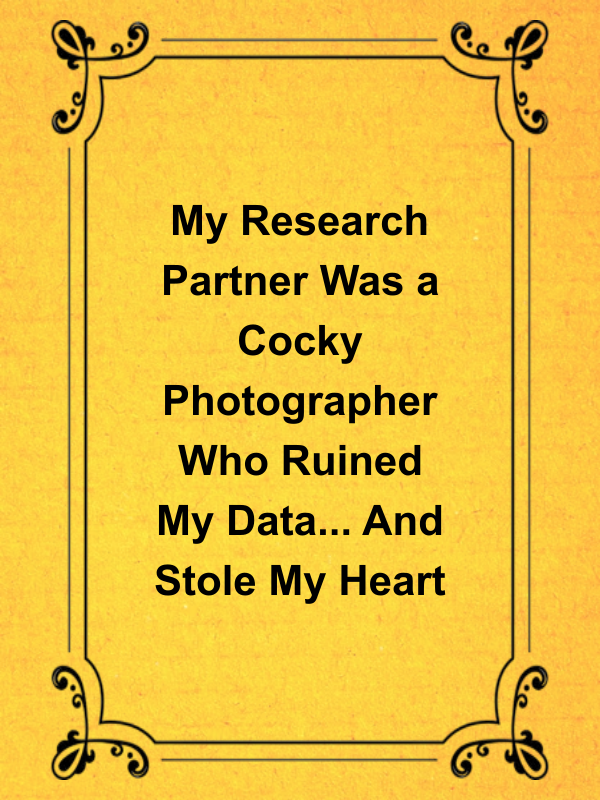My Research Partner Was a Cocky Photographer Who Ruined My Data... And Stole My Heart

Dr. Elara Vance arrives in the remote highlands of Papua New Guinea for a career-defining project, only to be stuck with a cocky photojournalist instead of the scientist she requested. Their professional rivalry turns personal when forced proximity and shared vulnerability reveal a passionate connection that defies all of Elara's data-driven logic.
The Analytical and the Abstract
The humidity hit Dr. Elara Vance like a physical blow the moment she stepped off the rattling single-engine plane. It was a thick, living thing, clinging to her skin and making the collar of her practical khaki shirt damp and uncomfortable. For three years, she had planned for this. Three years of grant proposals, preliminary research, and relentless politicking within the department. The highlands of Papua New Guinea were not just a location; they were the crucible for her career-defining work on restorative justice in pre-state societies. Everything had to be perfect.
Her two oversized Pelican cases, packed with a methodical precision that bordered on obsessive, were unloaded onto the dirt airstrip. Inside, waterproof notebooks, digital recorders, solar chargers, and a small, curated library of ethnographic texts were nestled in custom-cut foam. She was prepared for monsoons, equipment failure, and any number of tropical ailments. What she was not prepared for was the crumpled, sweat-dampened note handed to her by the outpost’s supply runner, a wiry man named Marcus.
“Dr. Sharma had a family emergency,” Marcus said, his gaze already drifting back toward the small hut that served as the outpost’s main office. “Flew out yesterday. The university sent a replacement on the same flight you came in on. He’s already here.”
Elara’s mind went blank for a second. Anya Sharma, the brilliant linguist whose work on Papuan dialects was legendary, was gone. She had been counting on Anya’s expertise to navigate the subtle nuances of the local language, to ensure her interview data was untainted by misinterpretation. A replacement? Who could they possibly find on such short notice?
“Who is the replacement?” Elara asked, her voice tight. “Which university are they from? I wasn’t notified of any change.”
Marcus shrugged, the gesture conveying a complete lack of interest in her academic dilemma. “Not a doctor. Some kind of photographer, I think. Name’s Kincaid. Said he’s here to document things.”
A photographer. The word landed in her gut like a stone. They had replaced a world-class linguist with a photographer. Her meticulously structured project, designed to collect quantifiable data on conflict resolution, was now partnered with someone who took pictures. All the careful planning, the rigorously designed methodologies, felt like they were dissolving in the oppressive heat. Her research depended on systematic interviews and linguistic analysis, on gathering hard, empirical data. She needed a scholar, a scientist. She had been sent an artist. Frustration, cold and sharp, cut through the wall of humidity. This wasn't a setback; it was a potential catastrophe. Her entire project, her entire career, felt like it was balancing on a knife’s edge before she had even unpacked her bags.
She marched toward the main hut, her jaw set. A man was sitting on the porch steps, wiping down a long camera lens with a soft cloth. He was dressed in worn cargo pants and a faded t-shirt that had seen too much sun. His arms were tanned and roped with lean muscle, and his dark hair was unruly. He looked up as she approached, and a slow, easy smile spread across his face, crinkling the corners of his eyes.
“You must be Dr. Vance,” he said, his voice a low, relaxed baritone that seemed out of place with her own coiled tension. He stood up, extending a hand. He was taller than she’d expected. “Liam Kincaid. I heard about the last-minute switch. Sorry you got stuck with me instead of the linguistic superstar.”
Elara took his hand. His grip was firm and warm, his palm calloused. She let go quickly. “The university failed to inform me of any changes to the research team. My work is highly dependent on linguistic analysis.”
“I get it,” he said, not seeming the least bit offended. He gestured with the lens toward a collection of soft, battered-looking canvas and leather bags slumped against the wall. They were a mess of pouches, straps, and zippers, a stark contrast to her own armored cases. Two camera bodies sat on a nearby crate, their lenses uncovered and pointing at nothing. It was sloppy. Unprofessional. “My gear’s a little different from Dr. Sharma’s, I’m sure.”
“My project requires quantifiable, empirical data, Mr. Kincaid. I’m studying the structural mechanics of conflict resolution.” She watched as he carefully reattached the lens to one of the cameras, his movements practiced and fluid.
“And I’m here to document the soul of the community,” he replied, looking up at her, his gaze direct. “The way a mother holds her child after a squabble is settled. The look in an elder’s eyes when he recounts a story of an old feud. The things that can’t be measured or transcribed.”
Soul. The word was like sandpaper on her nerves. It was a meaningless, abstract concept, a romantic notion for poets, not scientists. Her work was about patterns, systems, repeatable observations. He was talking about feelings. His entire methodology, if he even had one, was based on subjective interpretation. He wasn't a partner; he was a variable, an unpredictable element that threatened to contaminate every piece of data she collected.
“That sounds… artistic,” Elara said, the word tasting like an insult in her mouth.
Liam’s smile didn’t falter. If anything, it widened. “That’s the idea. You get the facts. I’ll get the truth.” He slung the camera over his shoulder. “Welcome to the outpost, Doctor. Try not to let the humidity get you down. It’s the least of our problems.”
The story continues...
What happens next? Will they find what they're looking for? The next chapter awaits your discovery.